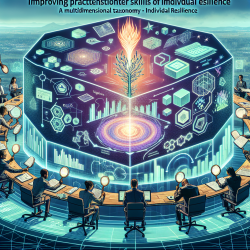Introduction
In the realm of child therapy, understanding how children cope with adversity is crucial. The recent study, "Social-Ecological Resilience Moderates the Effectiveness of Avoidant Coping in Children Exposed to Adversity: An Exploratory Study in Lithuania," offers valuable insights into the interaction between coping strategies and external resources in predicting trauma-related outcomes in children. This blog explores how practitioners can implement these findings to enhance their therapeutic interventions and foster resilience in children facing adversity.
Understanding Social-Ecological Resilience
Social-ecological resilience refers to the capacity of individuals to access and utilize psychological, social, cultural, and physical resources to sustain their well-being. This concept emphasizes the importance of external resources, such as supportive relationships and community networks, in enhancing a child's ability to cope with stress and trauma.
The Study's Key Findings
The study involved 372 Lithuanian children with a history of traumatic experiences. It revealed that:
- Active coping strategies were associated with lower levels of trauma-related symptoms.
- Avoidant coping strategies were linked to higher levels of anxiety, depression, and PTSD.
- Social-ecological resilience negatively moderated the relationship between avoidant coping and depression, suggesting that external support can buffer the negative effects of avoidant coping.
Implications for Practitioners
For mental health and psychosocial support (MHPSS) professionals, these findings highlight the importance of integrating social-ecological resilience into therapeutic interventions. Here are some strategies to consider:
- Foster Active Coping: Encourage children to engage in problem-solving and cognitive restructuring activities. These strategies can help them face stressors directly and reduce trauma-related symptoms.
- Enhance Social Support: Build strong support networks around the child, including family, friends, and community resources. This can provide a safety net that enhances resilience and mitigates the effects of avoidant coping.
- Tailor Interventions: Recognize the unique needs of each child and customize interventions to leverage their existing social resources. This personalized approach can amplify the effectiveness of therapeutic strategies.
Encouraging Further Research
While this study provides valuable insights, further research is needed to explore the mechanisms through which social-ecological resilience interacts with coping strategies. Practitioners are encouraged to engage in ongoing research and professional development to stay abreast of new findings and refine their approaches.
Conclusion
Integrating social-ecological resilience into child therapy can significantly enhance the effectiveness of interventions. By fostering active coping strategies and strengthening external support networks, practitioners can empower children to overcome adversity and achieve positive mental health outcomes.
To read the original research paper, please follow this link: Social-Ecological Resilience Moderates the Effectiveness of Avoidant Coping in Children Exposed to Adversity: An Exploratory Study in Lithuania.










